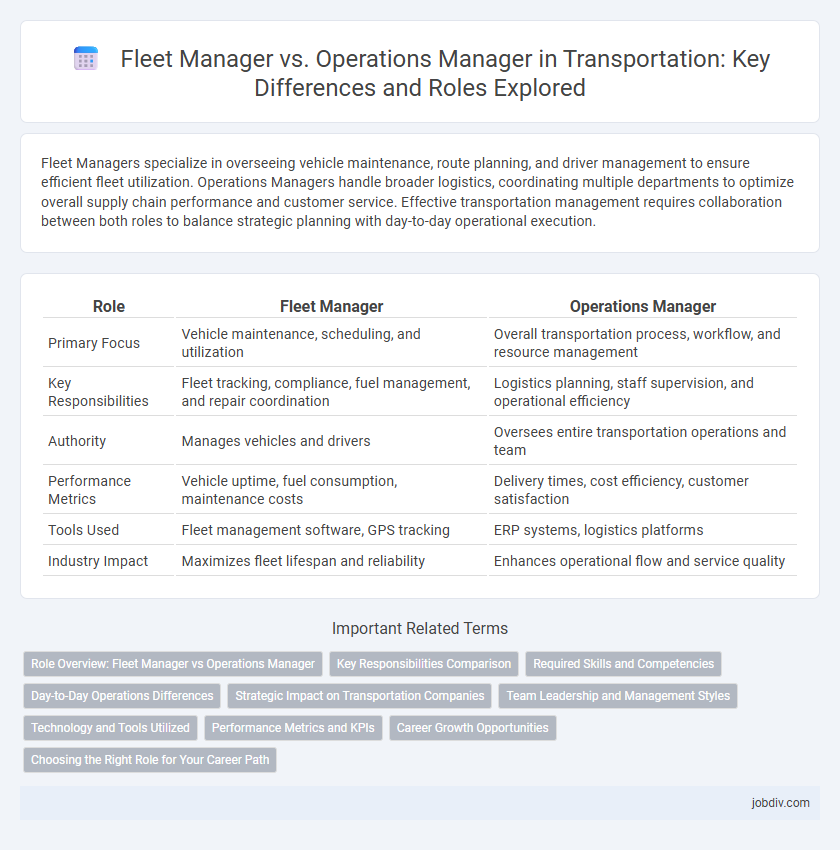Fleet Managers specialize in overseeing vehicle maintenance, route planning, and driver management to ensure efficient fleet utilization. Operations Managers handle broader logistics, coordinating multiple departments to optimize overall supply chain performance and customer service. Effective transportation management requires collaboration between both roles to balance strategic planning with day-to-day operational execution.
Table of Comparison
| Role | Fleet Manager | Operations Manager |
|---|---|---|
| Primary Focus | Vehicle maintenance, scheduling, and utilization | Overall transportation process, workflow, and resource management |
| Key Responsibilities | Fleet tracking, compliance, fuel management, and repair coordination | Logistics planning, staff supervision, and operational efficiency |
| Authority | Manages vehicles and drivers | Oversees entire transportation operations and team |
| Performance Metrics | Vehicle uptime, fuel consumption, maintenance costs | Delivery times, cost efficiency, customer satisfaction |
| Tools Used | Fleet management software, GPS tracking | ERP systems, logistics platforms |
| Industry Impact | Maximizes fleet lifespan and reliability | Enhances operational flow and service quality |
Role Overview: Fleet Manager vs Operations Manager
A Fleet Manager oversees vehicle acquisition, maintenance schedules, and compliance with transportation regulations to maximize fleet efficiency and safety. An Operations Manager coordinates logistics, manages staff workflows, and optimizes operational processes to ensure timely delivery and cost-effective transportation services. Both roles require strong leadership, but Fleet Managers concentrate on asset management while Operations Managers focus on overall process efficiency and resource allocation.
Key Responsibilities Comparison
Fleet Managers oversee vehicle maintenance schedules, fuel management, and compliance with transportation regulations to ensure optimal fleet performance. Operations Managers coordinate daily logistics, manage workforce allocation, and optimize route planning to enhance overall transportation efficiency. Both roles require strategic planning and resource management but differ in focus, with Fleet Managers concentrating on asset condition and Operations Managers on operational workflow.
Required Skills and Competencies
Fleet Managers require expertise in vehicle maintenance, route planning, and regulatory compliance to ensure efficient asset utilization and safety adherence. Operations Managers emphasize skills in workforce coordination, process optimization, and budget management to streamline daily logistics and improve service delivery. Both roles demand strong leadership, communication abilities, and proficiency in transportation management systems (TMS).
Day-to-Day Operations Differences
A Fleet Manager oversees vehicle maintenance, route planning, and compliance with transportation regulations, ensuring each asset operates efficiently and safely. An Operations Manager focuses on coordinating daily logistics, managing staff schedules, and optimizing workflow to meet delivery deadlines and customer service targets. While the Fleet Manager emphasizes equipment readiness, the Operations Manager prioritizes overall process management and resource allocation.
Strategic Impact on Transportation Companies
Fleet Managers optimize vehicle utilization and maintenance schedules to reduce operational costs and improve route efficiency, directly impacting the bottom line. Operations Managers oversee overall logistics, coordinating between departments to ensure timely delivery and regulatory compliance, thus enhancing customer satisfaction and operational scalability. Both roles are critical for strategic decision-making but differ in scope, with Fleet Managers focusing on asset management and Operations Managers driving broader organizational performance.
Team Leadership and Management Styles
Fleet Managers specialize in coordinating vehicle maintenance schedules and driver assignments with a transactional leadership approach that emphasizes meeting specific performance metrics. Operations Managers adopt a transformational leadership style, focusing on broader strategic goals such as workflow optimization and cross-departmental collaboration to enhance overall transportation efficiency. Effective team leadership in transportation requires aligning management styles with operational priorities to maximize resource utilization and employee engagement.
Technology and Tools Utilized
Fleet managers leverage GPS tracking systems, telematics, and fleet management software to monitor vehicle location, fuel consumption, and maintenance schedules, optimizing asset utilization and reducing operational costs. Operations managers use workforce management tools, route optimization software, and supply chain analytics to coordinate logistics, improve delivery efficiency, and ensure seamless operational workflows. Both roles rely heavily on integrated transportation management systems (TMS) to enhance decision-making, streamline communication, and support real-time data-driven strategies.
Performance Metrics and KPIs
Fleet Managers prioritize metrics such as vehicle utilization rate, maintenance costs, and fuel efficiency to optimize fleet performance and reduce operational expenses. Operations Managers focus on broader KPIs like on-time delivery rate, overall equipment effectiveness (OEE), and workforce productivity to ensure seamless coordination across transportation activities. Both roles rely on real-time data analytics and performance dashboards to drive continuous improvement and achieve organizational goals.
Career Growth Opportunities
Fleet Managers often advance by specializing in logistics technology, gaining certifications in vehicle maintenance systems, and managing larger fleets, which enhances their career trajectory within transportation and supply chain industries. Operations Managers benefit from expanding their expertise in cross-departmental coordination, mastering budget management, and driving process improvements that open pathways to executive roles like Director of Operations or Chief Operating Officer. Both positions provide significant upward mobility, but Fleet Managers concentrate on asset optimization while Operations Managers focus on strategic business growth.
Choosing the Right Role for Your Career Path
Fleet Managers specialize in vehicle acquisition, maintenance scheduling, and compliance with transportation regulations to ensure operational efficiency. Operations Managers oversee broader logistics processes, including route planning, resource allocation, and team management to optimize overall supply chain performance. Selecting the right career path depends on your preference for hands-on vehicle oversight versus strategic operational leadership within the transportation industry.
Fleet Manager vs Operations Manager Infographic

 jobdiv.com
jobdiv.com